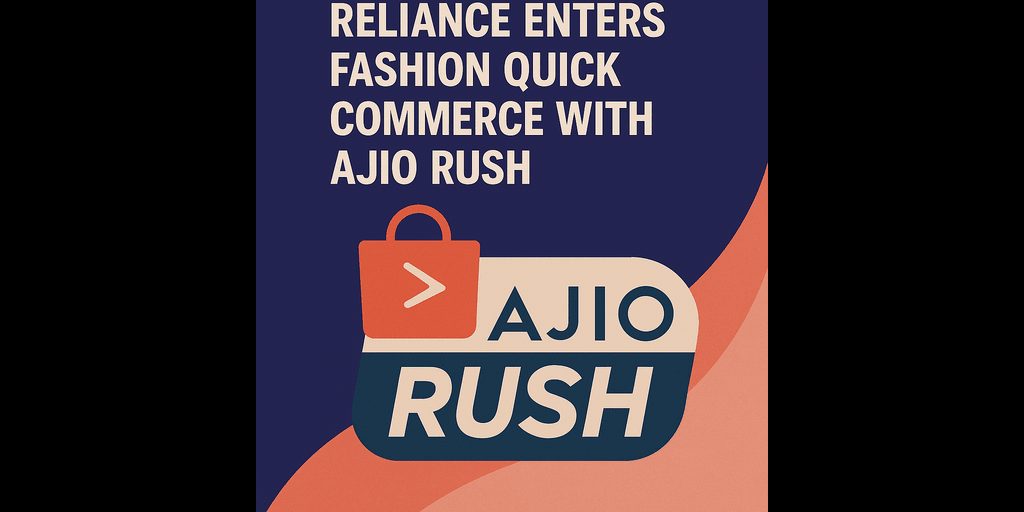Reliance Retail Ventures Ltd (RRVL), the retail arm of Reliance Industries, has entered the ultra‑fast fashion delivery market with Ajio Rush. Launched in Q1 FY2026, the service promises to deliver fashion products in under four hours to customers in six major cities: Mumbai, Delhi‑NCR, Bengaluru, Hyderabad, Chennai, and Ahmedabad.
Ajio Rush offers more than 130,000 styles encompassing casual wear, ethnic wear, footwear, accessories, and even a selection from Ajio Luxe—its premium fashion line.
The service uses dedicated dark stores leveraged from Reliance’s existing logistics network, aiming to curb the high burn rates seen in many VC‑backed quick commerce models.
Table of Contents
🚀 A New Phase in Quick‑Commerce
The quick‑commerce market in India, traditionally dominated by groceries and essentials, is rapidly expanding into fashion. Competitors like Myntra (with M‑Now), Newme, Slikk, and Snitch are now offering delivery windows from 30 minutes to four hours.
Reliance’s move with Ajio Rush marks its first focused entry into fashion quick‑commerce. According to RRVL, the pilot is already showing “promising unit economics”, driven by higher average order values and reduced return rates—common pain points in fashion delivery.
📊 Strong Early Indicators
In a post‑earnings call, CFO Dinesh Taluja revealed that average basket sizes via Ajio Rush are 50–60% higher than regular online orders. Additionally, 12–15% of bills are now fulfilled through the quick‑commerce channel.
Lower return rates further boost profitability, as fast delivery reduces uncertainty for consumers.
Ajio’s product catalogue has grown to 2.6 million SKUs, up 44% year‑on‑year. Revenue from new customers rose 18%, a jump of 150 basis points compared with last year.
🏬 Why Reliance Chose Organic Growth
Reliance is not acquiring any quick‑commerce startups. Instead, it is opting for organic growth by opening dark stores only in underserved areas where it lacks physical outlets.
CFO Taluja explained that building on existing infrastructure ensures better unit economics. “Dark stores are placed where volumes justify them, so they deliver profit from day one,” he noted.
🎯 Targeting Gen Z and Impulse Purchases
Ajio Rush is designed to cater to Gen Z and millennial shoppers seeking instant gratification through impulse purchases.
Industry experts say successful models combine online efficiency with offline trust. Snitch’s founder noted that quick fashion appeals to those needing “sudden outfits” for last‑minute plans. Others predict future quick‑commerce leaders will be hybrid models blending digital convenience with reliance on physical networks.
👟 Competitive Landscape
- Myntra’s M‑Now offers 30‑minute to two‑hour delivery in select urban pockets.
- Startups like Newme, Slikk, and Snitch have raised fresh funding to expand — Slikk secured $10 million, Snitch raised $40 million, and Newme pulled in $18 million.
- Blip, another quick‑fashion player, shut down after less than a year, highlighting the challenges of profitability and inventory management.
Despite mixed success, investor support remains strong in this space.
🛒 Reliance’s Advantage: Scale and Muscle
Ajio Rush benefits from Reliance’s vast retail ecosystem. With over 18,000 stores nationwide, Reliance can reuse distribution, warehousing, and tech infrastructure. This gives them scale and cost advantages over smaller rivals.
Their grocery quick‑commerce arm, JioMart, posted 68% sequential growth, using 2,200+ stores in 1,000+ cities—proof of the company’s capability in fast‑fulfilment operations.
🔭 Challenges Ahead
Fast fashion delivery faces operational hurdles such as:
- Managing millions of styles, sizes, and colours
- Handling potentially high return rates, though Ajio Rush reports lower levels
- Forecasting demand without major markdowns or over‑stocking
Experts say the sustainability of ultra‑fast fashion depends on balancing speed, scale, and cost.
✔️ Takeaway
Reliance’s Ajio Rush marks a bold move into fashion quick‑commerce. Leveraging its scale, mature infrastructure, and strong brand, Reliance aims to set new standards in delivery speed and unit economics. Its decision to grow organically—avoiding costly acquisitions—may offer it a distinct edge.
However, the model’s long‑term viability will rest on continued low returns, efficient inventory handling, and disciplined execution. Ajio Rush has set an ambitious stage; the next chapters will be shaped by market acceptance, cost discipline, and how well it navigates India’s rapid‑commerce labyrinth.

NextWhatBusiness Research Desk represents the editorial research function at NextWhatBusiness.
Content published under the desk is based on independent research, operator-level observations, and analysis of small, medium, and franchise-led business models in India.
The focus is on practical decision-making — including capital requirements, operational effort, and risk factors — rather than promotional or brochure-driven information.
Some articles reflect editorial judgment based on observed patterns and may include opinionated analysis where appropriate.
Editorial oversight is provided by Rupak Chakrabarty, Editor, NextWhatBusiness.



